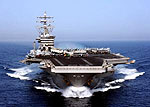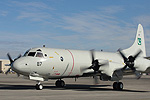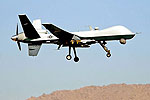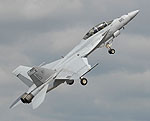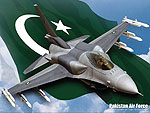Israel 'cuts arms sales to Turkey'
UPI
04/27/2010
TEL AVIV, Israel, April 26 (UPI) -- Israel will impose a temporary freeze on the sale of advanced weapons systems to Turkey, once a key ally, because of blistering criticism of the Jewish state by Turkey's Islamist Prime Minister Recep Tayyip Erdogan, Jane's Defense Weekly reports.
The latest outburst from Erdogan, who has been moving closer to Iran, came April 7 in Paris when he branded the Jewish state "the principal threat to regional peace" in the Middle East.
Meantime, the Israeli air force, blocked from Turkish air space and bracing for possible long-range attacks on Iran's nuclear infrastructure, is scouting for new training skies in Europe and Asia.
India has close military ties with Israel and that is being mooted as one option for the Israeli air force.
Jane's reported that the arms exporting arm of the Israeli Defense Ministry has ruled it will evaluate Turkish requests for Israeli-made weapons and equipment on a case-by-case basis.
One issue under review by the ministry's Foreign Defense Assistance and Export Organization, known by its Hebrew acronym, SIBAT, is a Turkish request for Israeli electronic warfare systems, the London magazine reported.
Turkey's military has also shown interest in the Spike anti-tank missile manufactured by Rafael Advanced Defense Systems and the Barak-8 naval air-defense missile produced by state-run Israel Aerospace Industry.
Relations between Israel and Turkey have been steadily deteriorating since the Israeli military invaded the Hamas-ruled Gaza Strip on Dec. 27, 2008, ostensibly to stifle rocket attacks, and fought a 22-day war before withdrawing Jan. 18, 2009, in the face of international condemnation.
Some 1,300 Palestinians, mostly civilians, were killed in the all-arms onslaught. Israeli casualties were 13 killed, nine of them soldiers.
That effectively ended a landmark 1996 military cooperation agreement, which covered a wide range of intelligence-sharing, between Israel and Turkey, an overwhelmingly Muslim nation and NATO's only Muslim member.
Israel's defense industry benefited from big-ticket sales to Turkey over the years.
Relations soured even further over delays by Israel in delivering six Heron unmanned aerial vehicles ordered by Turkey under a 2005 contract for 10 of the surveillance drones. IAI, Israeli defense manufacturer Elbit and Turkish Aerospace Industries were partners in the $183 million deal.
Jane's Defense Weekly reported that despite the nosedive in diplomatic relations, Israel and Turkey have maintained "a cautious business relationship" and discussed the joint sale of upgraded U.S.-built M-60 main battle tanks to Colombia.
Israel Military Industries and Arselan of Turkey delivered the last of 170 upgraded General Dynamics M-60A1 tanks to Turkey's army on April 7. Jane's Defense Weekly said a senior Colombian general attended the handover ceremony.
Erdogan's government excluded Israel from routine NATO air exercises last October in Turkey in reprisal for the Israeli invasion of the Gaza Strip the previous winter. It later banned Israeli aircraft from deploying in Turkey, where the Israeli air force, constrained by the Jewish state's small size, regularly conducted exercises in Turkey's extensive air space and varied terrain.
This lack of air space apparently has hampered air force training for possible long-range airstrikes against Iran, whose alleged nuclear arms program is viewed by Israel as an existential threat.
In recent years, the air force has intensified its long-range training schedule, presumably because of the growing threat from Iran.
The most prominent of these operations was a May 2008 exercise in which some 100 Israeli warplanes, including aerial tankers and command aircraft, flew the length of the Mediterranean from Greece to Gibraltar in what was widely seen as a dress rehearsal for an assault on Iran.
"We're looking for new places where we can fly," a senior air force officer told The Jerusalem Post.
"As a result," the newspaper reported, "the Defense Ministry is looking to continue an agreement it signed in 2006 that allows fighter jets to deploy in Romania.
"The (Israeli air force) sent jets to Romania for training in 2007 and plans to deploy aircraft there again later this year."
Two Israeli air force Gulfstream G-500 Shavit electronic intelligence aircraft were spotted over Hungary in March in what may have been an Israeli air exercise in Europe. The appearance of the aircraft caused a political controversy and the head of the air traffic department at Hungary's Transportation Ministry was subsequently dismissed.
traducción:
cortes de Israel venta de armas a Turquía
UPI
04/27/2010
TEL AVIV, Israel, 26 de abril (UPI) - Israel impondrá una congelación temporal de la venta de sistemas avanzados de armas a Turquía, una vez que un aliado clave, a causa de ampollas en la crítica al Estado judío por el islamista de Turquía del primer ministro Recep Tayyip Erdogan, Jane's Defence Weekly reporta.
El último estallido de Erdogan, que se ha estado moviendo más cerca de Irán, llegaron 07 de abril en París cuando calificó al Estado judío "la principal amenaza para la paz regional" en Oriente Medio.
Mientras tanto, la fuerza aérea israelí, bloqueado desde el espacio aéreo turco y preparándose para posibles ataques de largo alcance en la infraestructura nuclear de Irán, está explorando para capacitación de nuevos cielos de Europa y Asia.
India tiene estrechos lazos militares con Israel y que está siendo discutida como una opción para la fuerza aérea israelí.
Jane informó que la exportación de armas brazo del Ministerio de Defensa israelí ha declarado que evaluará las solicitudes de Turquía en busca de armas de fabricación israelí y el equipo sobre una base caso por caso.
Una cuestión que se examina por Ayuda al Exterior del Ministerio de Defensa y la exportación, conocida por su acrónimo hebreo, SIBAT, es una petición de Turquía para israelíes sistemas de guerra electrónica, la revista londinense informó.
El Ejército de Turquía también ha mostrado interés en la Espiga de misiles anti-tanque fabricado por Rafael Advanced Defense Systems y la Barak-8 misiles navales de defensa aérea producida por la estatal Industria Aeroespacial de Israel.
Las relaciones entre Israel y Turquía se han ido deteriorando desde que los militares israelíes invadieron la Gaza gobernada por Hamas en la Franja de 27 de diciembre 2008, aparentemente para frenar los ataques con cohetes, y se enfrentaron en una guerra de 22 días antes de retirar 18 de enero 2009, en el pesar de la condena internacional.
Unos 1.300 palestinos, la mayoría civiles, murieron en el ataque todas las armas. bajas israelíes fueron 13 muertos, nueve de ellos soldados.
Eso puso fin a un punto de referencia 1996 acuerdo de cooperación militar, que abarca una amplia gama de intercambio de inteligencia, entre Israel y Turquía, una nación musulmana y único miembro de la OTAN musulmán.
la industria de defensa de Israel se benefició de las ventas de alto precio a Turquía a lo largo de los años.
Relaciones agrió aún más por las demoras en la entrega por parte de Israel Garza seis vehículos aéreos no tripulados ordenados por Turquía en virtud de un contrato de 2005 de 10 de los aviones teledirigidos de vigilancia. IAI, fabricante israelí Elbit defensa y de Industrias Aeroespaciales de Turquía eran socios en el acuerdo de US $ 183 millones.
Jane's Defense Weekly informó que a pesar de la caída en picado en las relaciones diplomáticas, Israel y Turquía han mantenido "una relación de negocio prudente" y discutieron la venta en común de actualizar de fabricación estadounidense M-60 carros de combate a Colombia.
Industrias Militares de Israel y de Turquía Arselan entregado el último de 170 actualizado General tanques M-60A1 Dinámica al ejército de Turquía el 7 de abril. Jane's Defence Weekly dijo que un alto general colombiano asistió a la ceremonia de entrega.
El gobierno de Erdogan a Israel excluidos de la rutina ejercicios aéreos de la OTAN en Turquía en octubre pasado, en represalia por la invasión israelí de la Franja de Gaza el invierno anterior. Más tarde se prohibió la aviación israelí de desplegar en Turquía, donde la fuerza aérea israelí, por el tamaño pequeño del estado judío, realizadas de manera regular los ejercicios en el espacio aéreo de Turquía y amplia variedad de terrenos.
Esta falta de espacio de aire aparentemente ha obstaculizado la formación de la fuerza aérea de los ataques aéreos pueden tener a largo alcance contra Irán, cuyo supuesto programa de armas nucleares es considerado por Israel como una amenaza existencial.
En los últimos años, la fuerza aérea ha intensificado su programa de entrenamiento de largo alcance, presumiblemente a causa de la creciente amenaza de Irán.
El más prominente de estas operaciones fue un 05 2008 ejercicio en el que unos 100 aviones de combate israelíes, incluidos los petroleros aéreas y aviones de mando, voló la longitud del Mediterráneo desde Grecia a Gibraltar en lo que fue considerado como un ensayo general para un asalto a Irán.
"Estamos buscando nuevos lugares donde se puede volar", un oficial de alto rango de la fuerza aérea dijo a The Jerusalem Post.
"Como resultado", informó el periódico, "el Ministerio de Defensa, espera proseguir un acuerdo firmado en 2006 que permite a los aviones de combate para desplegar en Rumanía.
"La fuerza (aéreo israelí) envió aviones a Rumanía para la formación en 2007 y planes para desplegar aviones de allí otra vez a finales de este año".
Dos fuerzas aéreas israelíes Gulfstream G-500 Shavit aeronaves de inteligencia electrónica fueron vistos sobre Hungría en marzo en lo que pudo haber sido un ejercicio aéreo israelí en Europa. La aparición de los aviones causó una controversia política y el jefe del departamento de tráfico aéreo en el Transporte de Hungría Ministerio fue posteriormente despedido.
slds,
moises













